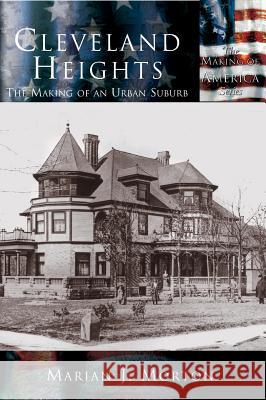Cleveland Heights: The Making of an Urban Suburb » książka
Cleveland Heights: The Making of an Urban Suburb
ISBN-13: 9781589731394 / Angielski / Twarda / 2002 / 162 str.
Now a bustling city of more than 50,000 residents, Cleveland Heights, situated just six miles from Cleveland's Public Square, boasts a history that begins well before its own incorporation. The region was once home to Native American tribes including the Erie and Seneca, and stalwart pioneers established settlements in the area as early as the late eighteenth century. In the post-Civil War period, as Cleveland was becoming an industrial metropolis, affluent residents began moving to the newly developed "garden suburbs," anxious to live closer to nature and farther from the smoky city and its increasingly diverse population. Born of this same desire, Cleveland Heights was founded in 1901. Here, in this isolated countryside owned by substantial families like the Silsbys, Minors, Comptons, and Taylors, entrepreneurs and city officials envisioned a clean and comfortable suburb for Cleveland's elite. Officially designated a city in 1921, Cleveland Heights quickly became not the homogenized suburb envisioned by early developers, but a community of widely divergent neighborhoods and people. Newcomers belonged to varying class, religious, ethnic, and racial backgrounds. A century after its founding, Cleveland Heights has become an "inner-ring urban suburb," boasting gracious homes of architectural distinction and attractive parks, but also facing the modern challenges of a dwindling population and commercial districts in need of economic revitalization. This new volume illustrates, in both word and image, the evolving life of Cleveland Heights from its beginning as part of East Cleveland Township, one of the region's first suburbs, to the present day.
Now a bustling city of more than 50,000 residents, Cleveland Heights, situated just six miles from Clevelands Public Square, boasts a history that begins well before its own incorporation. The region was once home to Native American tribes including the Erie and Seneca, and stalwart pioneers established settlements in the area as early as the late eighteenth century. In the post-Civil War period, as Cleveland was becoming an industrial metropolis, affluent residents began moving to the newly developed "garden suburbs," anxious to live closer to nature and farther from the smoky city and its increasingly diverse population. Born of this same desire, Cleveland Heights was founded in 1901. Here, in this isolated countryside owned by substantial families like the Silsbys, Minors, Comptons, and Taylors, entrepreneurs and city officials envisioned a clean and comfortable suburb for Clevelands elite. Officially designated a city in 1921, Cleveland Heights quickly became not the homogenized suburb envisioned by early developers, but a community of widely divergent neighborhoods and people. Newcomers belonged to varying class, religious, ethnic, and racial backgrounds. A century after its founding, Cleveland Heights has become an "inner-ring urban suburb," boasting gracious homes of architectural distinction and attractive parks, but also facing the modern challenges of a dwindling population and commercial districts in need of economic revitalization. This new volume illustrates, in both word and image, the evolving life of Cleveland Heights from its beginning as part of East Cleveland Township, one of the regions first suburbs, to the present day.











